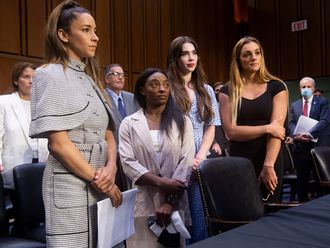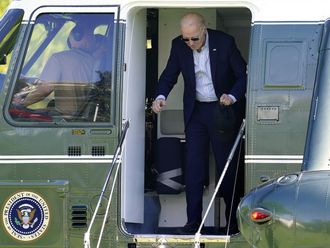Rio de Janeiro: The president of Brazil’s Senate was put on the defensive on Wednesday with the release of a secretly recorded conversation that reveals him proposing to weaken one of the key tools prosecutors have used to trap politicians and businessmen in a sweeping corruption scandal.
The released transcript and audio, published by the newspaper Folha de S. Paulo, appears to feed widespread suspicions that top lawmakers are trying to stifle investigations into billions of dollars in alleged bribes involving the state oil company, Petrobras.
The conversation shows Senate leader Renan Calheiros suggesting legal changes to bar the use of plea bargains with people who have been arrested. Prosecutors have used such deals, offering lighter sentences to persuade suspects to implicate high-ranking businessmen and politicians, including Calheiros.
“You can’t make a plea deal while arrested. That’s the first thing,” Calheiros allegedly said in a wide-ranging conversation about the Petrobras probe with Sergio Machado, an ex-senator and former head of another state oil company, Transpetro. Machado also is being investigated.
The Supreme Federal Tribunal, Brazil’s highest court, is considering seven investigations against Calheiros in the Petrobras probe. Even so, in the recording, Calheiros said he could “negotiate” with the justices a “transition” from President Dilma Rousseff to Vice President Michel Temer. He didn’t provide details in the taped conversation.
Rousseff was suspended by a Senate impeachment vote earlier this month and Temer has taken over as acting president while senators put her on trial within six months.
Calheiros’ office issued a statement acknowledging the conversation but insisting that the talks “don’t reveal, indicate or suggest any mention or attempt to interfere with” the Petrobras probe.
Later Wednesday, in another tap obtained and published by Folha, former President Jose Sarney promised Machado that he would help him overcome the Petrobras probe. Sarney, a political heavyweight whose son is environment minister, said he would work to keep the investigation against Machado out of the hands of lower court judge Sergio Moro.
Moro, the lead judge on the Petrobras probe, has gone after many people who don’t hold federal elected offices or Cabinet positions. Only the Supreme Federal Tribunal can decide to try the latter.
In a statement, Sarney said he was driven by “solidary” to help Machado. “I regret that private conversations become public because they can hurt others we would never want to reach,” he said.
The newspaper did not say when or by whom the recordings were made. However, on Wednesday, the Supreme Federal Tribunal announced that Machado had reached a plea bargain with prosecutors, making it a strong possibility he made the taps.
The court did not provide details of the deal and Machado’s whereabouts could not be determined.
The newly leaked audios came two days after another leak, also involving Machado, raised suggestions that this month’s impeachment and suspension of Rousseff was part of an attempt to stifle the Petrobras investigations.
That audio showed Romero Juca, a senator who was part of the Cabinet named to replace Rousseff’s, strategising with Machado about impeaching Rousseff to stop “the bleeding.” Juca announced he was taking a leave of absence within hours after the recording was released.
Rousseff has repeatedly said the allegations that she broke fiscal rules in managing the federal budget are a cover for a “coup” aimed partly at limiting the Petrobras probe.
On Wednesday, the Senate’s impeachment commission was considering a timeline for Rousseff’s trial.
Sen. Antonio Anastasia suggested the final vote happen Aug. 2, only three days before the opening of the Summer Olympics in Rio de Janeiro. More than 100 heads of state are expected to arrive in the days before the games begin.
Rousseff allies have said a schedule should not be set until after her defence is sent to the commission next week.












